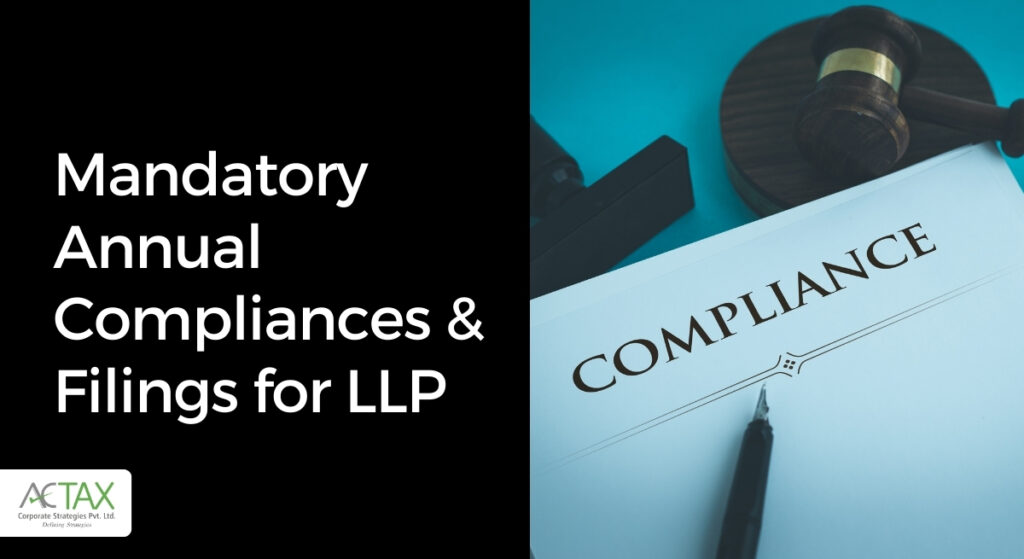If you are set to start a business under LLP or a newly started LLP firm in India, then this article helps you understand all required business compliances.
If you are an LLP Owner, you must understand the most common applicable annual compliances for LLP every year. True that your CA or CS should learn about it, but it is also beneficial if you as a Business Owner understand annual compliances.
If you are planning with your team to choose the proper business structure & decided to go with LLP, then you should learn the required compliances for this business structure to make a better decision. This article is all about helping LLP owners & prospects of LLP to make better decisions!
Table of Contents
Introduction to Annual Compliances & Filings for LLP
Limited Liability Partnerships (LLPs) are subject to various compliances to ensure legal adherence and transparency. Annual submissions include filing the Annual Return and Statement of Accounts, providing a snapshot of the annual compliances for LLP.
LLPs must also conduct regular board meetings, maintaining minutes and resolutions for documentation. Additionally, timely filing of Income Tax Returns is imperative to avoid penalties. LLPs must appoint an auditor and audit their accounts if the turnover exceeds the prescribed limit.
Adherence to these compliances ensures legal conformity and promotes credibility, instilling stakeholder confidence and fostering a conducive business environment.
Most Important: List of Annual compliances & Filings for LLP
Annual compliances for LLP are crucial to maintaining legal standing, financial transparency, and overall regulatory adherence. Complying with these requirements ensures that LLPs operate within the framework of the law and fulfill their responsibilities towards various stakeholders.
Here is a detailed exploration of the most critical annual compliances for LLPs:
1. Annual Return Filing – Important Aspect of Annual Compliance for LLP:
Filing the Annual Return (Form 11) is one of the fundamental annual compliances of LLP requirements. It contains information about the LLP’s partners, their contributions, and management or ownership structure changes during the financial year. The Annual Return must be filed within 60 days from the closure of the financial year.
2. Statement of Accounts – Major Aspect of Annual Compliances for LLP:
LLPs must file their financial statements, including the Statement of Accounts and Solvency (Form 8). This document provides an overview of the LLP’s financial position, including details of assets, liabilities, income, and expenditures. Like the Annual Return, the Statement of Accounts must be filed within 30 days of the end of six months of the financial year i.e, 30th October of every year.
3. Filing ard Meetings and Minutes:
Conducting regular board meetings is an essential corporate governance practice. LLPs must hold at least two board meetings each year, and the minutes of these meetings (MoM) should be maintained. Board meetings are a platform for discussing crucial business matters, making strategic decisions, and ensuring that the LLP complies with the law. Board MoM should be filed within the expiry of 6 months from the end of each financial year i.e., by October 30th of every year.
4. Appointment of Auditor:
LLPs must appoint an auditor to audit their accounts if their turnover exceeds the prescribed limit means if the LLP company exceeds an Annual turnover of ₹40 Lakhs, or if its contribution exceeds 25 Lakhs a year, as defined by the LLP Act. The auditor’s appointment must be ratified by the LLP partners in the Annual General Meeting (AGM). The auditor plays a vital role in independently verifying the financial statements, ensuring accuracy and reliability.
5. Income Tax Returns (ITR) Filing
LLPs are required to file their Income Tax Returns annually. The due date for filing ITR is generally on or before the 31st of July unless an extension is granted. If an LLP company has a turnover of more than ₹40 Lakhs a year, then the ITR due date filing shall be 30th September of every year.
Timely filing is crucial to avoid penalties and legal complications. LLPs must also obtain a tax audit if their turnover exceeds the threshold.
6. Annual Filing of Form 3 and Form 4:
Any changes in the annual compliances for the LLP agreement or the details of the partners during the financial year need to be intimated to the Registrar of Companies (RoC) by filing Form 3 and Form 4, respectively. This ensures the LLP RoC compliance has updated and accurate information about the LLP’s structure and management.
7. Mandatory Statutory Audit for LLP
LLPs must undergo a statutory audit of their financial statements by a qualified Chartered Accountant. It is mandatory for all LLPs irrespective of their annual turnover. The audit aims to ensure the accuracy and reliability of the financial information presented in the accounts.
Do You Want Actax Experts to Take Care of LLP Compliances?
Essential LLP Compliances with ROC
Complying with the Registrar of Companies (RoC) is crucial for Limited Liability Partnerships (LLPs) in ensuring legal adherence and maintaining transparency in their operations. The RoC is the regulatory authority that oversees the registration and regulation of companies and LLPs in India.
Here’s an explanation of essential LLP compliances with the RoC:
1. Incorporation Formalities is the LLP mandatory compliance:
The process begins with the incorporation of an LLP. The partners must file the necessary documents, including the LLP Agreement and other prescribed forms, with the RoC. The RoC issues a Certificate of Incorporation once satisfied with the compliance. Learn Process of LLP Registration in India: 5 Simple Steps
2. Maintaining Registered Office:
LLPs are required to maintain a registered office within India. Any change in the address must be communicated to the RoC by filing FORM LLP-15 within 15 days of the address change. This mandatory filing should be performed with necessary documents such as Proof of New Address, NOC from Owner, Board Resolution, Consent of Other Partners, and Change in LLP Agreement. Know More About – List of Documents Required for Company Registration in India [2024]
Hence, the RoC must be informed by LLP about the registered office locations at the time of incorporation and as it changes.
3. General Compliance:
LLPs must comply with various other regulations, such as the Goods and Services Tax (GST) Act, Income Tax Act, and other applicable laws. Regularly updating the RoC on these compliances ensures a smooth and legally sound operation.
Stay Compliant with ROC & MCA for Better Growth of Your LLP Firm!
In conclusion, understanding and adhering to the list of mandatory annual compliances for LLP is imperative for legal standing and sustained operations. Filing the Annual Return and Statement of Accounts, conducting board meetings, appointing auditors, and promptly notifying changes to the Registrar of Companies are critical obligations.
Strict compliance not only ensures transparency but also prevents penalties and legal repercussions. By staying informed and proactively meeting these requirements, LLPs can build trust with stakeholders, foster a culture of good corporate governance, and navigate the regulatory landscape successfully.
It is always advisable to work with experienced Chartered Accountants around you & take their feedback regularly. For business owners to stay updated with time-to-time notifications about LLP from MCA & ROC, subscribe to our blog.







Comments are closed.